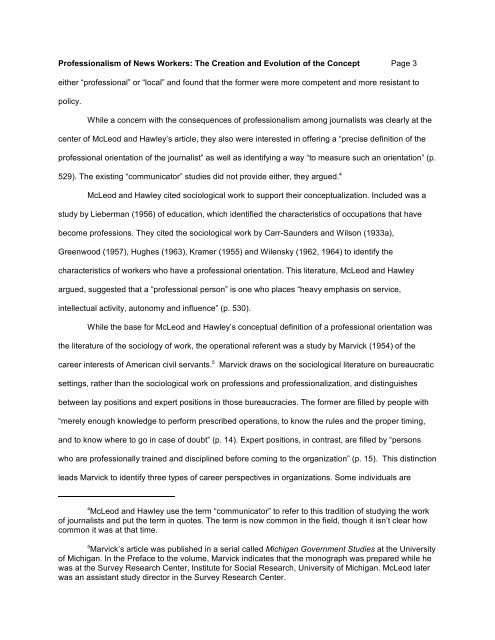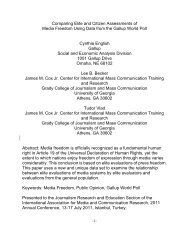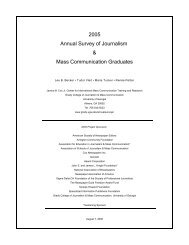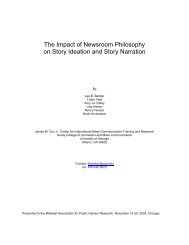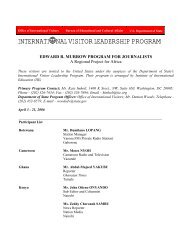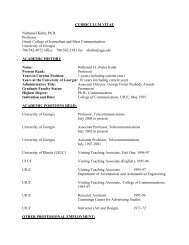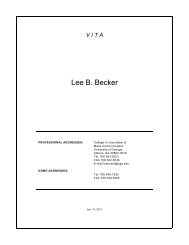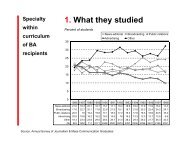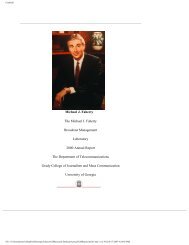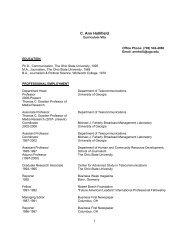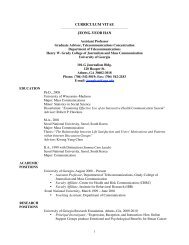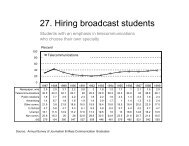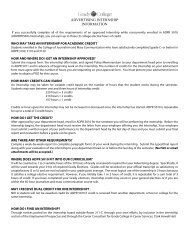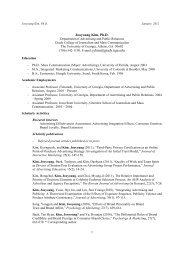Professionalism of News Workers - Grady College of Journalism and ...
Professionalism of News Workers - Grady College of Journalism and ...
Professionalism of News Workers - Grady College of Journalism and ...
You also want an ePaper? Increase the reach of your titles
YUMPU automatically turns print PDFs into web optimized ePapers that Google loves.
<strong>Pr<strong>of</strong>essionalism</strong> <strong>of</strong> <strong>News</strong> <strong>Workers</strong>: The Creation <strong>and</strong> Evolution <strong>of</strong> the Concept Page 3<br />
either “pr<strong>of</strong>essional” or “local” <strong>and</strong> found that the former were more competent <strong>and</strong> more resistant to<br />
policy.<br />
While a concern with the consequences <strong>of</strong> pr<strong>of</strong>essionalism among journalists was clearly at the<br />
center <strong>of</strong> McLeod <strong>and</strong> Hawley’s article, they also were interested in <strong>of</strong>fering a “precise definition <strong>of</strong> the<br />
pr<strong>of</strong>essional orientation <strong>of</strong> the journalist” as well as identifying a way “to measure such an orientation” (p.<br />
529). The existing “communicator” studies did not provide either, they argued. 4<br />
McLeod <strong>and</strong> Hawley cited sociological work to support their conceptualization. Included was a<br />
study by Lieberman (1956) <strong>of</strong> education, which identified the characteristics <strong>of</strong> occupations that have<br />
become pr<strong>of</strong>essions. They cited the sociological work by Carr-Saunders <strong>and</strong> Wilson (1933a),<br />
Greenwood (1957), Hughes (1963), Kramer (1955) <strong>and</strong> Wilensky (1962, 1964) to identify the<br />
characteristics <strong>of</strong> workers who have a pr<strong>of</strong>essional orientation. This literature, McLeod <strong>and</strong> Hawley<br />
argued, suggested that a “pr<strong>of</strong>essional person” is one who places “heavy emphasis on service,<br />
intellectual activity, autonomy <strong>and</strong> influence” (p. 530).<br />
While the base for McLeod <strong>and</strong> Hawley’s conceptual definition <strong>of</strong> a pr<strong>of</strong>essional orientation was<br />
the literature <strong>of</strong> the sociology <strong>of</strong> work, the operational referent was a study by Marvick (1954) <strong>of</strong> the<br />
5<br />
career interests <strong>of</strong> American civil servants. Marvick draws on the sociological literature on bureaucratic<br />
settings, rather than the sociological work on pr<strong>of</strong>essions <strong>and</strong> pr<strong>of</strong>essionalization, <strong>and</strong> distinguishes<br />
between lay positions <strong>and</strong> expert positions in those bureaucracies. The former are filled by people with<br />
“merely enough knowledge to perform prescribed operations, to know the rules <strong>and</strong> the proper timing,<br />
<strong>and</strong> to know where to go in case <strong>of</strong> doubt” (p. 14). Expert positions, in contrast, are filled by “persons<br />
who are pr<strong>of</strong>essionally trained <strong>and</strong> disciplined before coming to the organization” (p. 15). This distinction<br />
leads Marvick to identify three types <strong>of</strong> career perspectives in organizations. Some individuals are<br />
4<br />
McLeod <strong>and</strong> Hawley use the term “communicator” to refer to this tradition <strong>of</strong> studying the work<br />
<strong>of</strong> journalists <strong>and</strong> put the term in quotes. The term is now common in the field, though it isn’t clear how<br />
common it was at that time.<br />
5<br />
Marvick’s article was published in a serial called Michigan Government Studies at the University<br />
<strong>of</strong> Michigan. In the Preface to the volume, Marvick indicates that the monograph was prepared while he<br />
was at the Survey Research Center, Institute for Social Research, University <strong>of</strong> Michigan. McLeod later<br />
was an assistant study director in the Survey Research Center.


